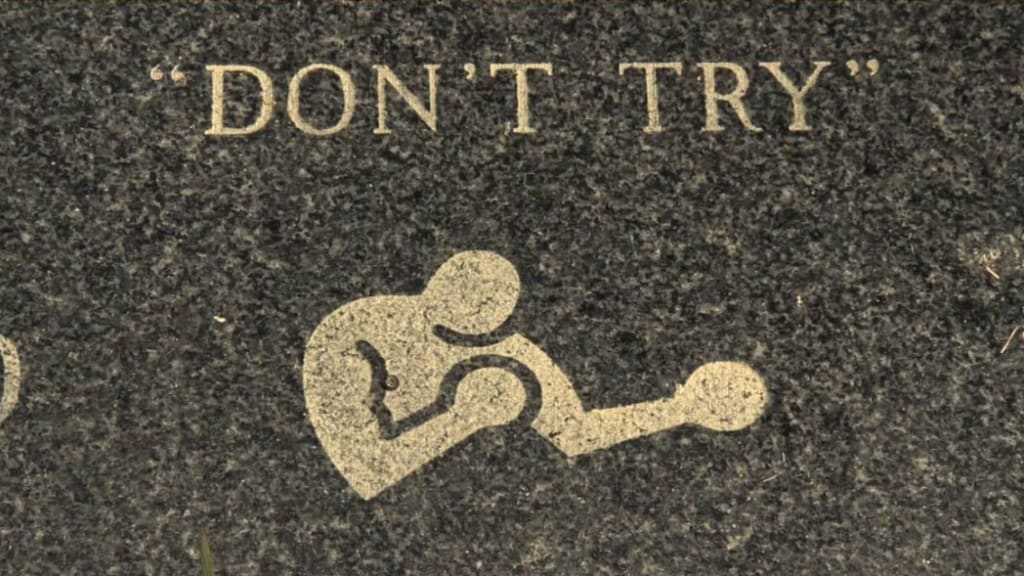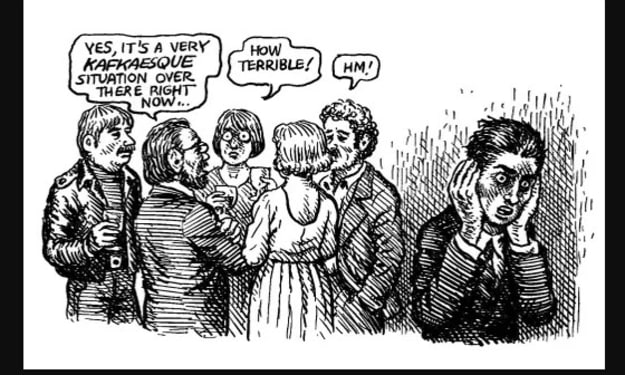Don't Try: Charles Bukowski's Approach to Life
Don't Try

American writer and poet Charles Bukowski is renowned for his uncensored, biting, and frequently crass perspectives on life. In 1920, Bukowski was born in Germany, and in 1923, he moved to America with his family. Beginning when he was six years old, Bukowski's father often beat him. Bukowski, a German immigrant, endured bullying at school and throughout his adolescence due to comments made by other children about his dialect and garb.
Bukowski had a condition that left his face covered in severe acne and acne-related lesions, which made him feel even more self-conscious and alone. Bukowski's childhood and adolescence were marked by abuse and loneliness, which shaped his outlook on life and his urge to express himself via writing. In a far later interview, Bukowski claimed that his father had been a great literary mentor because he had taught him the meaning of pain—specifically, the meaning of pain that had no justification. When you've been thrown out of yourself for a while, you'll be more likely to speak what you mean. Bukowski in his twenties, two years out of college, is what I stated.
Bukowski would drop out of school and launch his first significant career as a writer. Penning hundreds of brief narratives while traveling the country and working temporary blue-collar jobs. But during this time, only a few of the hundreds of pieces would end up being published, and those that did have little to no success. Bukowski virtually quit writing after a few years, frustrated by the publishing procedure and his apparent incapacity to compose successfully. The following years saw Bukowski working at numerous blue-collar jobs. Then, in 1955 at the age of 35 and after going without writing for roughly ten years, Bukowski almost died of a terrible bleeding ulcer. He did, however, live, and as fate would have it, he did so shortly after.
Bukowski recommenced writing after quitting his work at the post office at the time. Bukowski published other works over a few more years, but none was successful, so he was compelled to go back to the post office he had left earlier. This time, though, it was different since He carried on writing while he was at the post office. He would write during any free time he had before his shift. Bukowski would continue doing this for many years, occasionally having a collection of his writings published in various journals, all with very little actual success and no real prospect of fame, fortune, or even just making a living as a writer. For years, Bukowski continued to write almost every day before going to work. Of course, we all know how his narrative turned out because he is currently being discussed as a writer. a person who was well-known, accomplished, and significant enough to be remembered years after his passing. Bukowski, who is regarded as one of the Greats of all time, didn't start to become historically or publically popular until he was in his fifties. The second period of employment at the post office lasted for many more years. Bukowski's work wasn't eventually recognized as valuable by an audience until after a long period of composing characteristic Skees-style pieces, as well as after signing a contract with a publisher who promised to support his work. Bukowski started to use it to support himself in some way. near the end of the conventional career schedule, at age 50.
When Bukowski finally had a chance, he took it. He would soon become more and more successful and well-known in the field of literature and general society after what seemed like too many people thought it was over. Bukowski struggled and tried for years and years until everything ultimately fell into place in his favor. To acquire what he had wanted since he was a youth and accomplish what he thought his life was meant to be for, so he could gather momentum and succeed as a writer. The fact that his gravestone reads "Right now, don't try" in this situation is at least initially puzzling. A message that seems odd on a gravestone, especially one with such a message, and at odds with the narrative. How could a man who, despite it taking some time, succeeded in realizing his ideal of himself, a man who, due to his persistent effort, eventually gained enormous respect and acclaim for his art? How could he leave the phrase "don't try" as his parting gift? This is possibly where the most significant concept in both Bukowski's writing and life can be found. in a letter to writer buddy and publisher William Packard
"Too many writers write for the wrong reasons. They want to get famous or rich or they wish to get laid by the girls who have bluebells in their locks when everything works best," wrote Bukowski. It's not your fault; writing picked you, not the other way around. It gets crammed in your ears, nostrils, and under your fingernails when you're angry with it. When there is no other option. Info Kowski addresses prospective authors in this letter, but he may be talking about something far bigger—the idea of success and purpose in artistic endeavors in general. When you were very young as well as someone asking you what your favorite color was for the first time, you may have thought it was an option to say blue or red or something else, but it wasn't really. Nobody picks the feelings that different colors evoke in individuals or why some seem to paint the brain with nicer feelings than others. We can explain why we prefer certain colors, but we can't decide why we do; the color kind of picks us. It's simple to just decide which one seems best and announce without trying in a circumstance with very low stakes, like when we're asked to choose our favorite color.
However, how one determines their purpose and goes about living the majority of their life is neither simple nor fraught with low risks, making it inherently more difficult and intricate. Even if it can be fundamentally similar to knowing your favorite color. In a similar letter to Packard Bukowski, the author said, "We work too hard, try too hard, don't try, don't work—they're looking right at us, taking the kick out of the closed room." In this, Bukowski suggests that if you have to attempt to care about a subject or to want something, you might not care about it, you might not want it, or it might not even be your favorite color. Bukowski never diminished or altered his voice for the benefit of something else, returning to writing regularly throughout his life. Never let rejection or pain experienced along the way stop him from writing in the end. Bukowski attempted to be a writer, but he didn't try to desire to be one. It's not that he didn't try; it's just that he didn't try to be someone he wasn't. He also didn't make an effort to write in the style he preferred; he simply did it and kept doing it. At least in terms of creativity, it seems that when we are authentically ourselves, attending to who we genuinely are and what we genuinely want to say or accomplish without the addition of ulterior reasons, without pushing it, and without overthinking it, we typically perform at our best. Bukowski may have had this in mind. Since Bukowski is the only person who can truly speak for or understand what Bukowski ever truly believed or meant, none of this can be interpreted as implying that something is difficult or difficult to achieve as opposed to being simple or given 'el because it isn't.
It's not as if writing, filmmaking, painting, music creation, business, or anything else must come naturally to the writer, filmmaker, painter, musician, etc. For it to be an appropriate thing or for them to be outstanding at it. It's all unclear and complicated, just like the very brain that creates the entire system. Bukowski might "say don't try but" at this point because it is likely that the agony and endurance of going through the process will not feel worthwhile and you will not feel motivated to do it even when faced with the prospect of rejection, suffering, or sacrifice. If it does, it means that the concept of not doing the item hurts more than the notion of maybe going through pain, or if the idea of never having experienced it at all or living without it terrifies you. Perhaps Bukowski will "say here try" and if you decide to try, go all the way Charles Bukowski if it seems like you're not trying when it comes to you.
About the Creator
Ian Sankan
I am a writer with proven writing ability in various fields. I consider writing a passionate career and a platform through which I extend my intellectual ability.






Comments
There are no comments for this story
Be the first to respond and start the conversation.